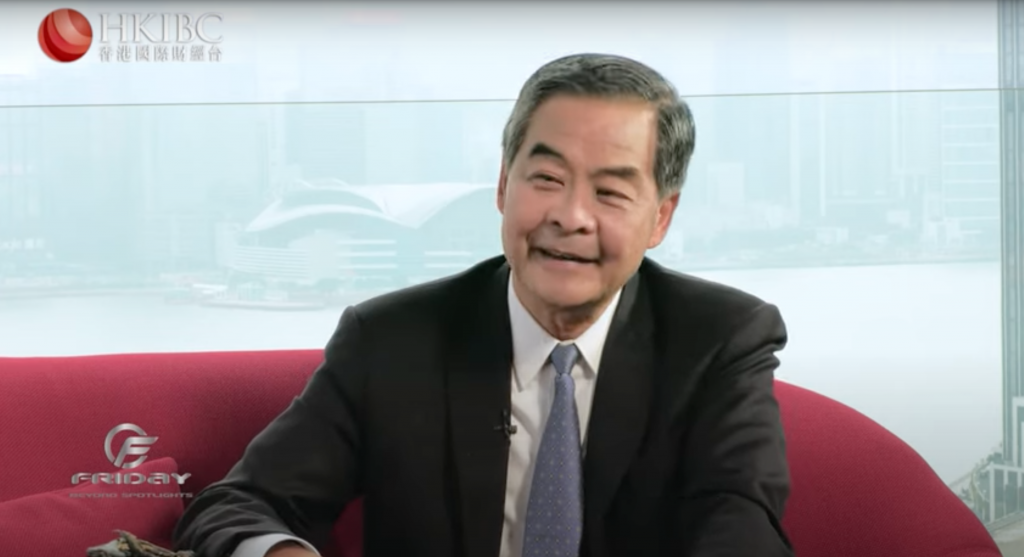- People in the city on the southern coast of China got rich by moving goods without them ever touching the ground
- The community’s extraordinary trading skills were highlighted by former Hong Kong leader CY Leung in a new business show, Friday Beyond Spotlights
- Hong Kong has become the “super-connector” between the rest of China and the rest of the world
HOW DID A PLACE so small it doesn’t show up on a school globe become so rich so quickly? Short answer: By creating an import-export center that operates as a “floating city” in which goods being bought and sold literally never touch the ground.
People in Hong Kong buy products from a distance and sell them to customers elsewhere—but arrange for them to be delivered direct from maker to buyer, often without ever being delivered to Hong Kong.
This turned the city, a struggling third world place as recently as the 1960s, into one of the world’s wealthiest places today.

Hong Kong’s skill in offshore trading was highlighted by one of the city’s former leaders, Leung Chun-ying (above), in a TV interview yesterday. “We are a very good super-connector,” he said.
He highlighted the case of Japanese food. Tiny Hong Kong imports more Japanese food than the entire United States, or indeed any country in Europe. How come?
Much of it is reexported, sometimes without ever landing on Hong Kong soil, said Mr Leung, speaking on Friday Beyond Spotlights, a new TV show from Hong Kong Cable TV and the creators of this website.

Japan’s own export statistics show that Hong Kong has been top global importer of Japanese food for 13 years, and in the latest count, we share that crown with mainland China. In third and fourth places are the United States and Taiwan.
How does it work?
- Hong Kong people place orders for more Japanese food that their city could ever consume.
- A portion of the Japanese food goes into the community, which has a huge appetite for sushi, sashimi and other such items.
- A second portion goes to Hong Kong International Airport, which has special facilities for handing cold-chain products, before they are shipped into the mainland market or elsewhere in the world.
- A third element is “transshipped via Hong Kong” – with the city never actually importing the foodstuffs, but working as a dealmaker.
Efficiency is key – and speed is something that Hong Kong officials, at least on some occasions, can be good at. Because foods are perishable, people moving items which need permission find that applications can be made around the clock, and officials in Hong Kong almost always grant permission within hours.
CY Leung said that Japanese food was just one example, but there were many. Another was fine wine – Hong Kong are not big wine-drinkers, but the city is one of the world’s biggest wine consumers in terms of the import trade.

Similarly, without achieving fame for having world class artists, Hong Kong has nonetheless become a global center for the art investment sector.
“I know it’s a quite a thing to say about a city of just 7.5 million people,” Mr Leung said, but the city really is the super-connector “between the rest of China and the rest of the world.”

The former Chief Executive of Hong Kong highlighted an interesting change in the shipping business in the city. It was maturing fast from a place in which “moving boxes” was the bulk of the activity into a center for “desk-based” shipping activity.
“Hong Kong is moving slowly away from just container-based port activities, meaning just moving boxes around, to what London for example does as a major maritime hub, contrasting port activities with desk-based activities, not shore based activities: providing services in the sale and leasing of ships, restoration of ships, insuring of ships, financing of ships, and legal services that go with the activities that I previously mentioned,” he said.
He urged young people to be aware of the fast-growing business activity around them, in particular the ports and other businesses opening up in Guangdong province.
The full interview with CY Leung can be seen on YouTube, with part one focusing on business and part two taking a more personal view. The interview was conducted by Patrick Tsang of Cable TV.
Friday Beyond Spotlights will air on Friday nights at 8.30 pm (HK) on Cable TV channel 76 in Hong Kong, and will also be available on the YouTube sites of Cable TV and Fridayeveryday.
Season One of the show is hosted by Patrick Tsang On-yip, Vice-Chairman and Executive Director of i-Cable Communications and CEO and Director of Chow Tai Fook Enterprises; and Nick Chan Hiu-fung, a lawyer and elected lawmaker serving on the National People’s Congress.
In the interview, Mr. Leung said that trading was in Hong Kong’s DNA and recalled that when he was a child, 60 years ago, there used to be an area on the waterfront of Sheung Wan called Nam Buk Hong, meaning “south-north trade zone”. This was seen as the dividing line between all the peoples to the north and all the peoples to the south – and Hong Kongers saw their job as taking goods from each side to the other.

Sixty years later, using digital communication and their deal-making skills, Hong Kong people are doing the exact same thing.
Image at the top from Venti Views on Unsplash
Click here to go to our YouTube channel
Want to read more business stories?
The extraordinary story of one of the biggest crypto robberies in history
The “first man to eat a crab” — how share investing became a thing in China
Guangdong to overtake Canada, Australia in GDP
